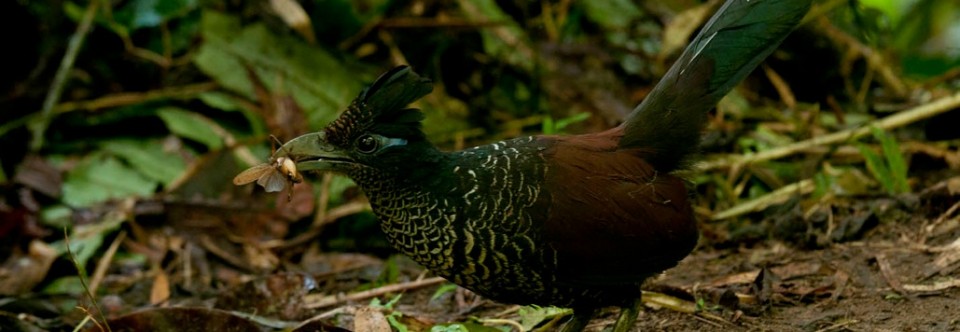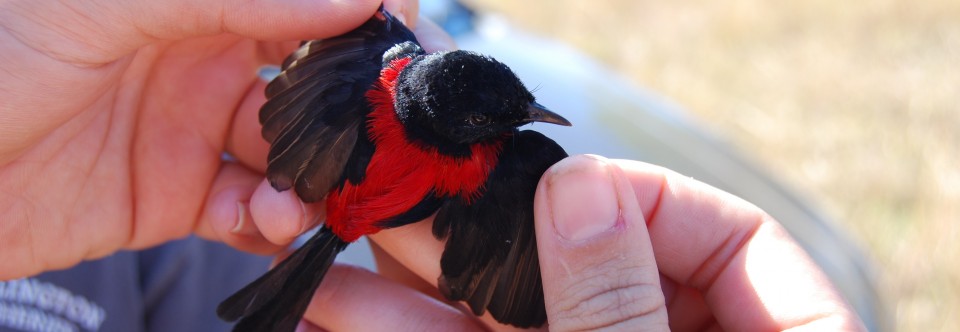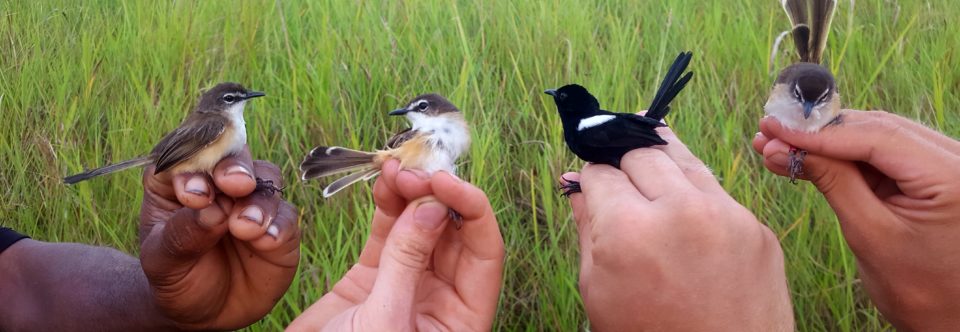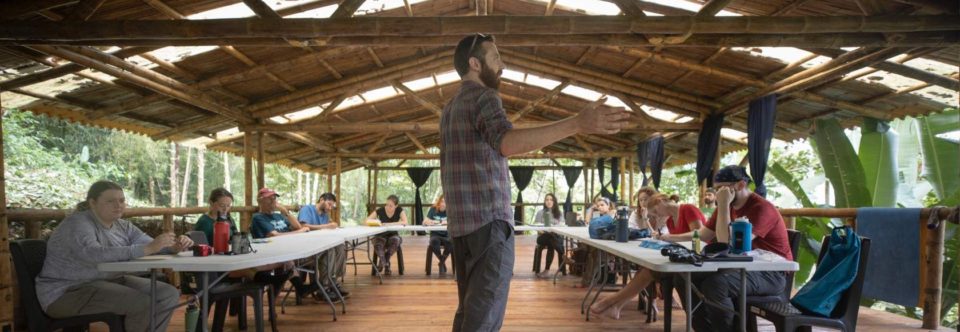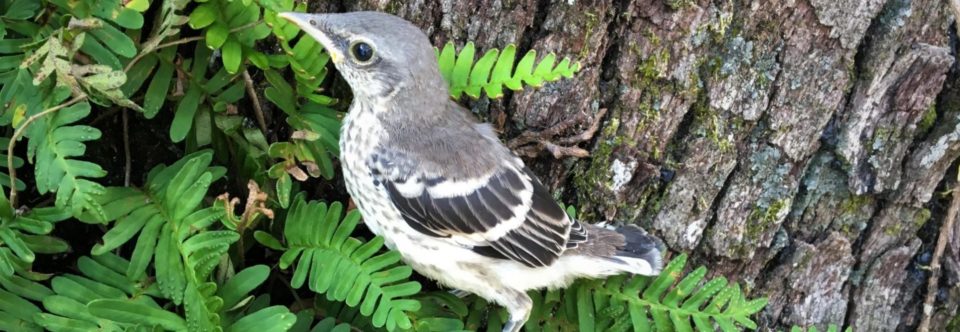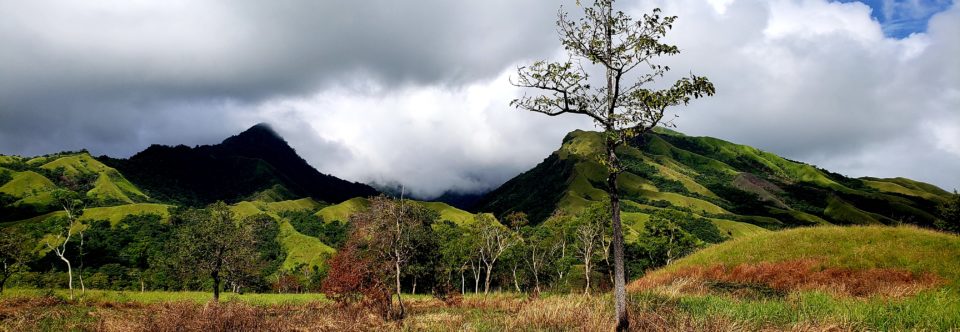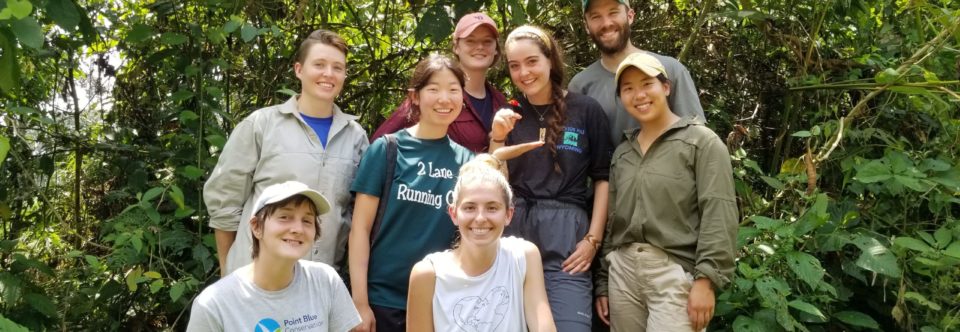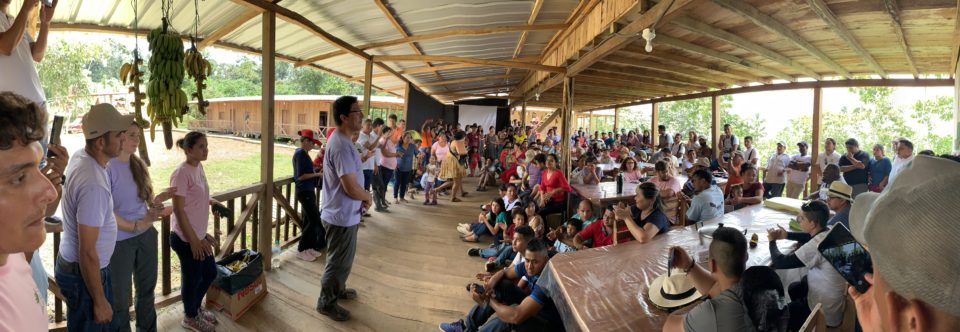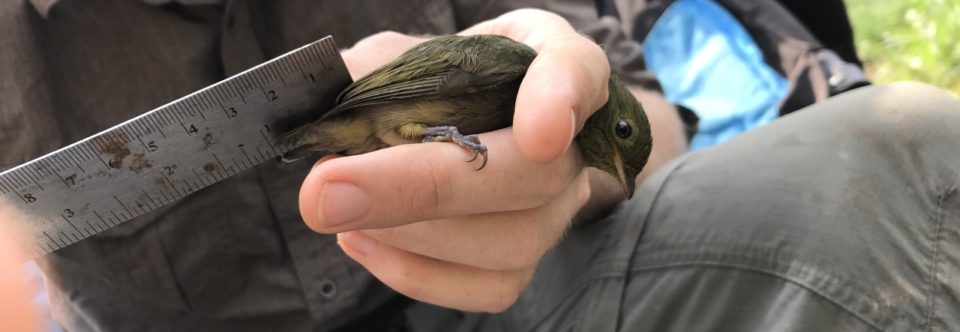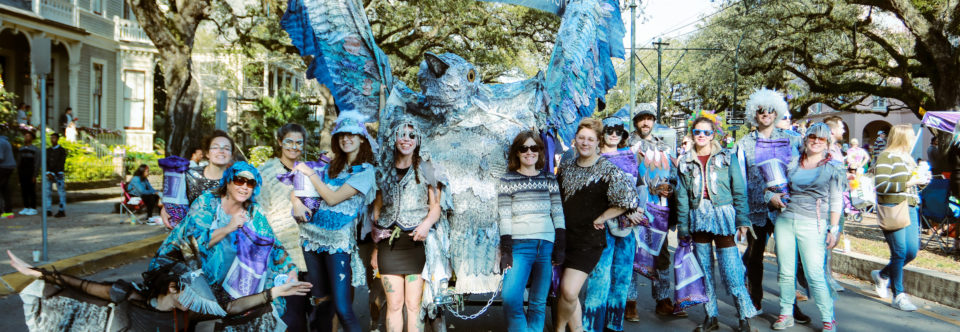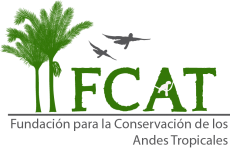"Welcome!"
Welcome! Our lab explores how the environment that organisms experience shapes their ecological, behavioral, evolutionary, and conservation trajectories. We focus our research on animal and plant and plant systems around the world, with active studies on plant-animal interactions, mating systems, demography and survival, signal evolution, movement and dispersal, and endangered species. Our lab takes a socially aware approach that combines community-engaged participatory research with capacity building, training, and education in the biodiversity hotspots where we work.
Fall 2022
The Karubian lab wrapped up 2022 on a high note, with students Katie Rompf and Kat Perkins successfully defending their MS theses. Here is an overview of what lab members have been up to!
Therese Lamperty moved from the University of Washington in Seattle to Tulane where she started a fellowship with the American Association of University Women to focus on finishing up a project with Jordan that they began during her PhD. The project involves investigating potential genetic consequences for trees that might follow the loss of primates and other fruit-eating and seed-dispersing animals in the Amazon. In addition, she spent a lot of time getting reacquainted with New Orleans life and getting settled. She also gave workshops to elementary and middle schools to teach children about pollinators and how to identify them. Lastly, she published a paper with her PI at the University of Washington, Berry Brosi, called “Loss of endangered frugivores from seed dispersal networks generates severe mutualism disruption” in Proceedings of the Royal Society B and had another paper accepted in the journal Conservation Science and Practice, which is a project examining the rewilding of Singapore with her previous PIs at Nanyang Technological University (Matthew Luskin and David Wardle).
Kaushik Narasimhan is finishing up with a defense date at the end of April. He is working to resubmit his first chapter and is applying for jobs. The next semester will be a busy one!
Annelise Blanchette has been busy this semester (still) writing the manuscript for the first chapter of her dissertation, and she hopes to submit it for review early next semester. She has also been learning how to preprocess transcriptomic data so she can jump into differential gene expression analysis early next semester. She’ll hopefully start the manuscript for that chapter over the winter break, but we’ll see about that. She’s made some changes to her third chapter and will spend winter break planning out the methods so everything goes smoothly in the spring. Per usual, she ran a half marathon this semester and it was just okay.
Mike Ellis returned from his year in Ecuador and, tragically, missed crawdad season entirely. He has been honing his R skills while delving deeper into the contentious debate around beta diversity analyses and their partitioning for his first chapter. He had another paper on hummingbird diversity in forest fragments accepted to Biotropica that he co-authored with previous honors student Kyu Min Huh.
Luke Anderson spent the semester as a TA for the Molecular and Evolutionary Genetics course at Tulane and contributed to various ongoing projects in the lab. He received a student presentation award for his talk about manakins at the Society of Canadian Ornithologists conference in September. In addition, he has been preparing for his upcoming stint at the Braun Lab at the Smithsonian National Museum of Natural History, where he will be investigating the effects of sexual selection on Z-chromosome genetic diversity across the manakin phylogeny.
Judith Santano is now in her 2nd year and is working hard to solidify her research ideas. This past field season, she spent 3 months at FCAT in Ecuador. She built up her mist netting skills by co-leading a field team of 7 undergraduate students to survey the plots in FCAT’s ongoing reforestation project. She caught and banded over 100 hummingbirds!!! A major win for her grad school journey. She also taught the Tropical Biology Field Course with Luke and Sarah where they led the bird team. However, the summer was not all work. Judith and other Karubian lab members went to ATBC (her first conference as a graduate student) in Cartegena, Colombia, where she got to meet some incredible scientists. She also had the opportunity to visit the Galapagos for this first (but DEFINITELY not last) time for a post-field work vacation! This semester she’s focused on teaching for the first time, continuing with her outreach work, applying to grants, and reading as much as possible. Next field season is already on her mind, but she’s enjoying her big life here in New Orleans.
Jordan was on sabbatical in Fall 2022 but still found ways to keep busy. In addition to kayaking the Louisiana bayous, he visited Ecuador several times as part of his Fulbright Fellowship, and helped to set up the TIERA Program at Tulane.
Read MoreSpring 2022
The Karubian Lab had an active Spring 2022! We were all glad to celebrate Mardi Gras in person again! Sarah Khalil and John Jones both defended outstanding PhD theses on fairywrens, and we wish them the best as they move onto the next steps in their careers. Graduating seniors Ellie Casement and Sloan Livaccari defended their honors theses and won departmental honors for their work. And, Megan Narasimhan joined the team as the Program Manager for the Ecuador Scholars Program, and has had a tremendous impact—welcome aboard Megan! We are all ready for summer to begin and to get back into field research!
Sarah Khalil has officially flown the nest (get it?) and started her NSF postdoc at the Cornell Lab of Ornithology, but not before enjoying her last Mardi Gras as a New Orleans resident! As part of her postdoc, she will continue to work to understand the mechanisms of color production in red-backed fairywrens and how variation in color leads to variation in individual reproductive success, as well as expanding her work among other avian systems. Sarah also will be attending the Animal Behavior Conference in Costa Rica this July where she will present her work on sexual selection in fairywrens, and will then meet back up with some of the Karubian lab in Ecuador where she will be an instructor for the Tulane tropical field ecology course at FCAT.
John Jones also successfully defended his PhD thesis in Spring 2022. He published studies from his thesis work on white-shouldered fairywrens in Behavioral Ecology and Sociobiology and Hormones and Behavior, and he has a number of additional papers in review. He spent the summer in New Orleans wrapping up his thesis chapters and is now on the hunt for a post-doctoral or faculty position.
Kaushik Narasimhan had a productive spring semester. Now that he has all of his data, he is working on his second and third chapters while submitting his first chapter for publication. He also had another paper published as co-author. He earned several grants this past semester, including the Lewis and Clark Grant. He plans to be an instructor for the Ecuador field course over the summer and work hard to finish up his dissertation.
Annelise Blanchette has been keeping busy this spring moving her dissertation ahead. She is currently working on the manuscript for her first chapter and plans to submit it soon. She’s been in the lab doing RNA extractions and out in the field collecting lizards for her second chapter. She was awarded the Gaige Fund Award for her work on Anolis cognition and ran a half marathon in March where she finished with a new personal best time and placed second in her age group. Her plan is to finish all field and experimental work this summer so she can begin writing in earnest come the fall semester.
Mike Ellis spent the spring semester wrapping up his Fulbright field work, travelling throughout NW Ecuador to collect forest vegetation data. He’ll use those data to calculate above ground biomass and model the impacts of natural and anthropogenic forces on forest structure, maturity, diversity, and disturbance. He’s also happy to report that his manuscript with collaborator A. Lele on variation in avian morphology driven by elevation over short vertical and horizontal distances was published in Biotropica. He is extraordinarily excited to be returning to NOLA and plans to eat many a crawdad.
Luke Anderson wrapped up his third major field season in Ecuador, where he was radio tracking white-bearded manakins and monitoring fruit availability at lek sites. He then had a chance to explore the Amazon for a week and returned to New Orleans just in time for the Mardi Gras festivities. He spent the remainder of the semester preparing for his prospectus defense—he passed and has advanced to candidacy! He returned to South America several times this summer, assisting with manakin-related projects at the FCAT station, presenting some preliminary findings at the Association for Tropical Biology and Conservation conference in Cartagena, Colombia, and serving as a teaching assistant for the Tulane undergraduate field course in Ecuador.
Judith Santano has had a BIG year! She’s officially done with her first year of the PhD and is proud of how much she has grown in this short time. She spent the spring busy with the Ornithology course, developing her research plans for this summer, and getting trained up to work with hummingbirds. Some highlights of this semester were getting to see Roseate Spoonbills for the first time, teaching kids about pollination at the zoo, and experiencing her first Mardi Gras! She has been working with Nancy Newfield to learn how to band hummingbirds so that she can study them in Ecuador. This summer she’ll be down at the FCAT station studying pollination across a gradient of regeneration. She’s incredibly excited to spend 3 months in the field working on her own research and learning from all the other scientists who will also be at the station. Hopefully she returns to New Orleans a hummingbird expert!
Jordan has continued to develop the Ecuador Scholars Program with support from the Stone Center for Latin American Studies, the Newcomb Institute, Tulane’s Office of the President, and other partners. The program welcomed its first cohort of students in Spring and is gearing up to expand this upcoming year. He had a busy summer and is looking forward to being on sabbatical in Fall 2022!
Read More
